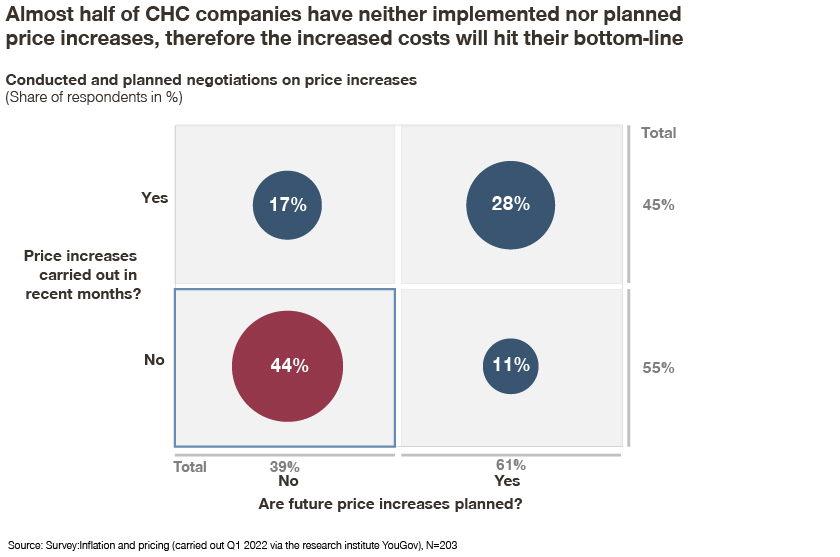Inflation is having an effect on industries throughout the world, and consumer healthcare is no different. However, our Inflation Pricing Study found that many CHC companies are still hesitating to act on pricing. Experts Clemens Oberhammer and Jan Merkel reveal why an optimal pricing strategy is key to ensure profitable growth in an uncertain, high inflationary environment.
One of the biggest challenges across many industries today is the inflationary pressure driven by supply chain challenges, which is escalating the situation globally.
As reported by the International Monetary Fund in the second quarter of 2022 global inflation was at 7.2 percent, EU zone inflation reached 8.6 percent, and in the USA it reached 9.1 percent as of July 2022.
As such, the consumer healthcare (CHC) sector, like many others, will have to deal with ongoing cost increases which will put margins under pressure. As well as assessing a wide range of industries, our 2022 Inflation Pricing Study surveyed more than 200 consumer healthcare managers to find out how they are planning to handle this situation.
In this article, we draw from our survey results to reveal how the CHC industry is currently handling the inflation crisis. We also give our own recommendations on how to ensure long-term profitable growth.
Despite rising costs, many CHC companies are still hesitant to raise prices
More than half of CHC companies expect cost increases of more than 5 percent in the next year. Adopting the right pricing strategy, therefore, will be key to mitigating margin pressure.
This is due to the profit formula. There are only three profit drivers – price, volume, and fixed costs – as profit is volume times price minus costs. Inflation affects both costs and volumes negatively, only price can compensate for profit losses. This is best illustrated in the image below.

However, many CHC companies still hesitate to act on pricing. Our study found that approximately 44 percent of respondents haven’t increased their prices in recent months, nor do they plan to.
The 28 percent who have successfully increased prices are already planning future measures. This confirms that consistent and smart price increases are one of the most successful measures in fighting cost pressures.

Hesitation to increase prices directly correlates with a growing anxiety among CHC companies about quantity losses. Our survey revealed that 25 percent of respondents deem a decrease in sales volume “not an option”.
Concern over losing customers is, of course, understandable, but not helpful. The majority of cases for “profit optimal price” are calling for an increase in some extent, at least, while allowing adequate volume reductions.

However, even the many companies who are acting on price don’t actually achieve the price increase they had planned. In our Global Pricing Study 2021, we found out that on average companies only realized 33 percent of their targeted price increase.
It’s clear then, that while price increases are the answer, there are many hurdles to overcome. So, how can CHC companies ensure success in an inflationary environment?
The right path to inflation resilience
“The important thing is to act and not simply become a victim of inflation."
Hermann Simon, Founder, Simon-Kucher & Partners
Profit erosion is already a threat that CHC companies must face, and it's one that won't likely fade in coming years. To come out on top, CHC companies must rethink and adjust their strategies accordingly. The key will be to strengthen the organization’s inflation resilience. There are five key steps to ensuring this:
1. Implement a value-based, data-driven approach
Implement a systematic value-based pricing approach to determine the optimal price adjustments in an efficient and standardized way. This pricing approach should connect price increase strategy and objectives with the execution. Additionally, a systematic monitoring and feedback loop ensures that prices are executed as planned. The process should be based as much as possible on data and evidence:

2. Ensure agility and a fast-acting organization
Spot the need and opportunities for price increases early – fast responses and agility are necessary. In times of high-cost increases, a delay of a few months can drastically reduce your company’s annual profits. Make sure that governance, internal processes, and incentives are aligned with the need for adaptations. Additionally, in times of high inflation, pricing decision should be based on future cost of goods sold (COGS). Any cost variations should be tracked and identified early on, to ensure optimal pricing practices.
3. Adopt a forward-thinking mindset
Be aware that inflation cannot be tackled with one-off solutions. Multiple, recurring price adaptations might be needed over a longer period. CHC companies must switch from annual price rounds to multiple price changes during the year if needed. These should be followed by clear communication. It will be important to act fast.
4. Manage for profit
Securing a resilient and healthy business in the long term, requires a focus on profits. This might seem obvious, but many companies still make decisions based on volume and market share. CHC companies must prioritize profit targets through pricing excellence.
This also includes company incentives. These should be linked to profit to ensure the management and sales teams keep this top-of-mind.
5. Allow for moderate losses
The fear of losing customers or volumes can paralyze decision-makers. However, our experience has shown that fears of very high losses usually turn out to be unfounded. Losses can be kept to a minimum, e.g., through applying differentiated pricing approaches. However, companies should allow for a certain amount of customer or volume loss.
Key Takeaways
Strengthening inflation resilience through implementing a systemic price increase process in the company DNA is crucial for success. Companies should be ready to react fast and be flexible in the ways they create, review, and adjust their prices.
Reach out to our authors if you want to learn more!








